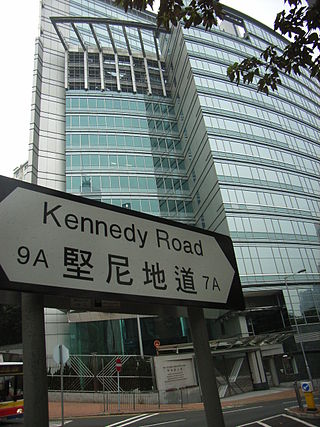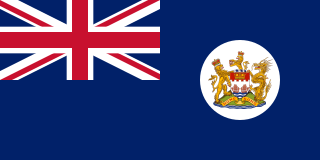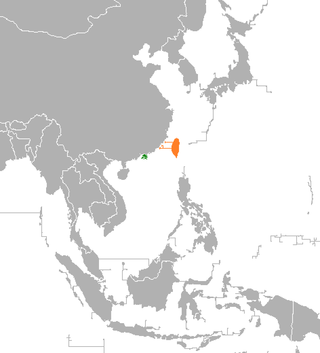
The politics of Hong Kong takes place in a framework of a political system dominated by its quasi-constitutional document, the Hong Kong Basic Law, its own legislature, the Chief Executive as the head of government and of the Special Administrative Region and of a politically constrained multi-party presidential system. The Government of the Hong Kong Special Administrative Region of the People's Republic of China is led by the Chief Executive, the head of government.

Under the Basic Law, the Hong Kong Special Administrative Region is exclusively in charge of its internal affairs, whilst the central government of China is responsible for its foreign affairs and defence. As a separate customs territory, Hong Kong maintains and develops relations with foreign states and regions, and plays an active role in such international organisations as World Trade Organization (WTO) and the Asia-Pacific Economic Cooperation (APEC) in its own right under the name of Hong Kong, China. Hong Kong participates in 16 projects of United Nations Sustainable Development Goals.

The special administrative regions (SAR) of the People's Republic of China are one of four types of province-level divisions of the People's Republic of China directly under the control of its Central People's Government, being integral areas of the country. As a region, they possess the highest degree of autonomy from China's central government. However, despite the relative autonomy that the Central People's Government offers the special administrative regions, the National People's Congress and its Standing Committee remains capable of enforcing laws for the special administrative regions.

The Convention of Peking or First Convention of Peking is an agreement comprising three distinct unequal treaties concluded between the Qing dynasty of China and Great Britain, France, and the Russian Empire in 1860.
Gweilo or gwailou is a common Cantonese slang term for Westerners. In the absence of modifiers, it refers to white people and has a history of racially deprecatory and pejorative use. Cantonese speakers frequently use gwailou to refer to Westerners in general use, in a non-derogatory context, although whether this type of usage is offensive is disputed by both Cantonese and Westerners.

The handover of Hong Kong from the United Kingdom to the People's Republic of China was at midnight on 1 July 1997. This event ended 156 years of British rule in the former colony, which began in 1841.

The Hong Kong Certificate of Identity (CI) was a formal travel document and passport, issued by the Hong Kong Government's Immigration Department until 30 June 1997. It is no longer possible to possess a valid CI as a travel document, as all CIs have expired by 30 June 2007, though most CI holders should be eligible to hold the HKSAR Passport.

The Hong Kong Special Administrative Region passport is a passport issued only to permanent residents of Hong Kong who also hold Chinese citizenship. In accordance with the Basic Law of the Hong Kong Special Administrative Region, since the handover in 1997, the passport has been issued by the Immigration Department of the Government of Hong Kong under the authorisation of the Central People's Government of the People's Republic of China. As the official languages of Hong Kong are Chinese and English, the passport is printed bilingually in both Chinese and English. In addition, unlike Chinese passport which can be issued by Chinese diplomatic missions abroad, the Immigration Department of Hong Kong is the only issuing authority for HKSAR passports.

Chinese nationality law details the conditions by which a person holds nationality of the People's Republic of China (PRC). The primary law governing these requirements is the Nationality Law of the People's Republic of China, which came into force on September 10, 1980.

The Macao Special Administrative Region of the People's Republic of Chinapassport is a passport issued to Chinese citizens who are permanent residents of the Chinese Special Administrative Region of Macau.
Refugees in Hong Kong have formed historic waves arriving in the city due to wars in the region and Hong Kong's historical role as a trading and transit entrepôt. More recently those seeking asylum or protection based on torture claims are a fast growing part of the city's population, increasing since 2004 due to changes in the legal system for considering asylum and torture claims mandated by local courts.
The Exarchate of the Philippines is an exarchate or sub-diocesan entity of the Eastern Orthodox Metropolis of Hong Kong and Southeast Asia that is located in the Philippines. The metropolis is one of four metropolises in Asia that are under the jurisdiction of the Ecumenical Patriarchate of Constantinople. The exarchate has five parishes and three chapels in the country.

Taiwanese nationality law details the conditions in which a person is a national of the Republic of China, commonly known as Taiwan. The Nationality Act is based on the principle of jus sanguinis, children born to at least one Taiwanese parent are automatically nationals at birth. Foreign nationals with residency in Taiwan may naturalize after continuously living in the country for at least five (5) years. Certain foreign immediate family members of Taiwanese nationals may naturalize after continuously living in the country for at least three (3) years.
The Metropolis of Hong Kong and Southeast Asia is a metropolis or archeparchy of the Ecumenical Patriarchate of Constantinople in the Eastern Orthodox Church. It is equivalent to an archdiocese in the Catholic Church. It is centred on the city of Hong Kong and has jurisdiction over Eastern Orthodox Christians in Hong Kong, Macao, China, Taiwan, Mongolia, the Philippines, Vietnam, Cambodia, Laos, Thailand and Myanmar. Furthermore, it was established in November 1996 by the Holy Great Synod of Constantinople. The incumbent metropolitan is Nektarios Tsilis.
Chinese people in the Czech Republic form one of the country's smaller migrant communities.
With the establishment of the People's Republic of China in 1949, American immigration policy towards Chinese emigrants and the highly controversial subject of foreign policy with regard to the PRC became invariably connected. The United States government was presented with the dilemma of what to do with two separate "Chinas". Both the People's Republic of China and the Republic of China wanted be seen as the legitimate government and both parties believed that immigration would assist them in doing so.

Hong Kong was a colony and later a dependent territory of the United Kingdom from 1841 to 1997, apart from a period of Japanese occupation from 1941 to 1945 during the Pacific War. The colonial period began with the British occupation of Hong Kong Island in 1841, during the First Opium War between the British and the Qing dynasty. The Qing had wanted to enforce its prohibition of opium importation within the dynasty that was being exported mostly from British India and was causing widespread addiction among the populace.
A national without household registration (NWOHR) is a person with Republic of China nationality who does not have household registration in Taiwan. Nationals with this status may be subject to immigration controls when entering the Taiwan Area, do not have automatic residence rights there, cannot vote in Taiwanese elections, and are exempt from conscription. Most individuals with this status are children born overseas to Taiwanese citizens. About 60,000 NWOHRs currently hold Taiwanese passports with this status.
The Metropolis of Singapore and South Asia is a diocese of the Ecumenical Patriarchate of Constantinople in the Eastern Orthodox Church. It is centered in Singapore and has jurisdiction over Eastern Orthodox Christians in the countries of Singapore, Indonesia, Malaysia, Brunei, East Timor, the Maldives, Sri Lanka, Bangladesh, India, Nepal, Bhutan, Pakistan and Afghanistan. It was founded in January 2008 by the Holy Synod of the Ecumenical Patriarchate of Constantinople.

Relations between the government of Hong Kong and the Republic of China (Taiwan) encompass both when the Republic of China controlled mainland China, and afterwards, when the Republic of China fled to Taiwan.











